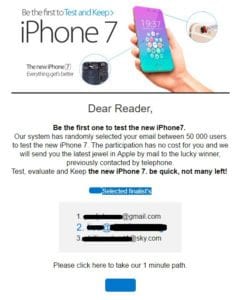AppRiver has warned of a ‘free iPhone 7’ scam that is currently circulating. Paul Tolbert – Email Security Specialist at AppRiver commented below.
Paul Tolbert, Email Security Specialist at AppRive:
 ” With the imminent release of the iPhone 7, consumers and media outlets alike have been casting their
” With the imminent release of the iPhone 7, consumers and media outlets alike have been casting their
predictions on what’s in store for Apple’s latest smartphone. Rumors and unverified “leaked” images of the mobile device continue to circulate on the Internet. It’s no wonder that cybercriminals seek to take advantage of this golden opportunity by offering consumers a “free iPhone 7.”
An image of the scam is also available here: https://blog.appriver.com/wp-content/uploads/2016/08/iphone7scam.jpg|
Paul continues, ” The campaign attempts to sell itself as a product test invite for the latest smartphone device. The recipient receives an email offering a chance to test drive a new iPhone 7. Curiously, the email informs the recipient that around 50,000 users will be allowed to test the device in a random lottery-like selection. The email instructs the user to click on the provided link to answer a short survey in order to qualify. And of course, a fake iPhone 7 product test offer wouldn’t be complete without an unofficial photo of the device itself.
“It shouldn’t take too much to spot this as spam. For starters, Apple is known to be very tight-lipped with unreleased products and services. It would be a huge change in direction for them to a) do a mass product test of a new iPhone device, and b) announce such a test via an email blast. We also noticed some irregularities with the email’s source IP, from address and subject line. Coupled with several grammatical errors in the email and you have a not-so-convincing spam email. Better luck next time for these cybercriminals.”
AppRiver’s advice to anyone receiving this, or similar offers via email is to never click on a link, or an attachment, from an unsolicited email. Remain vigilant and try to use simple logic – if it seems too good to be true, and it is sitting in your inbox, delete it.







Most Commented Posts
2020 Cybersecurity Landscape: 100+ Experts’ Predictions
Cyber Security Predictions 2021: Experts’ Responses
Experts’ Responses: Cyber Security Predictions 2023
Data Privacy Protection Day (Thursday 28th) – Experts Comments
Experts Insight On US Pipeline Shut After Cyberattack
Most Active Commenters
Recent Comments
“Cybersecurity Awareness Month’s new evergreen theme "Secure Our World” is…
“Avoid storing data on personal devices: A crucial but often overlooked…
“I recommend a new nuance to passwords that isn’t often…
“In my role overseeing cloud environments and incident response, I'm…
“Cybersecurity Awareness Month serves as a reminder to confront the…